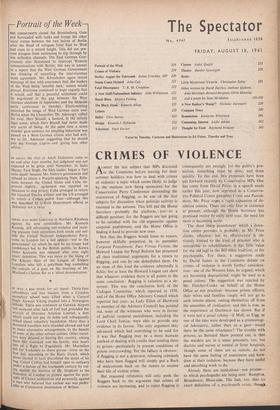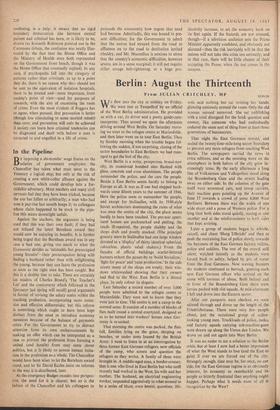CRIMES OF VIOLENCE
A Lmos-r the last subject that MPs discussed A the Commons before leaving for their summer holidays was how to deal with crimes of violence; a topic which seems likely, to judge by the motions now being sponsored for the Conservative Party Conference demanding the restoration of flogging, to be one of the first subjects for discussion when political activity is resumed in the autumn. This will put the Home Secretary—probably the platform, too—in a difficult position; for the floggers are not going to be satisfied with the old arguments against corporal punishment, and the Home Office, is finding it hard to provide new ones.
Not that the floggers would listen to reason, however skilfully presented. In its pamphlet Corporal Punishment, Fact Versus Fiction,, the Howard League for Penal Reform has presented all their traditional arguments for a return to flogging; and one by one demojished them. On an issue of this kind the evidence admittedly is fickle; but at least the Howard League can show that whatever evidence there is all points to the same conclusion: flogging is valueless as a de- terrent. This was the conclusion both of the Cadogan Committee, which reported in 1938, and of the Home Office Advisory Council which reported last year; as Lady Elliot of Harwood (a member of the Advisory Council) has pointed out, none of the witnesses who were in favour of judicial corporal punishment, including the Lord Chief Justice, were able to provide any evidence in its favour. The only argument they advanced which had something to be said for it was that flogging may be a more humane method of dealing with youths than sending them to prison—particularly in present conditions of prison overcrowding. Yet the fallacy is obvious: if flogging is not a deterrent, releasing criminals who have been flogged will simply put a flock of malcontents back on the streets to resume' their life of violent crime.
But reasoned refutation will only push the floggers back to the argument that crimes of violence are increasing, and to reject flogging is consequently not enough; for the public's pro- tection, something must be done, and done quickly. To this end, two proposals have been put forward recently by' Conservative MPs. One has come from David Price; in a speech made earlier this year, now reprinted as a Conserva- tive Political Centre pamphlet Crime and Punish- ment, Mr. Price urges a rapid expansion of de- tention centres. There are only four in existence at present; although the Home Secretary has promised twelve by early next year, the need for more is becoming acute.
'The short sharp punishment' which a deten- tion centre provides is probably, as Mr.' Price claims, effective;' but its effectiveness is ob- viously limited to the kind of prisoner who is susceptible to rehabilitation; it has little 'value for the old, lags in the Bill' Sikes tradition, or for psychopaths. For these, a suggestion made by David James in the Commons debate on crimes of violence is worth further considera- tion: one of the Western Isles, he argued, which are becoming depopulated, might be used as a penal colony. The suggestion was rejected by Mr. Fletcher-Cooke on behalf of the Home Office as not practical—because prison officers, their wives and families simply will not go to such remote places, cutting thethselves off from the amenities of civilisation; and this is true, as the experience of Dartmoor has shown. But if it were not a penal colony7-if Mull, or Eigg, or one of the isles were developed as a criminologi- cal laboratory, rather than as a gaol—would there be the same reluctance? The trouble with prisons, as Bernard Shaw pointed out, is that the warders are in a sense prisoners, too; but doctors and nurses at mental or fever hospitals, though some of them are as remote, do not have the same feeling of resentment and bore- dom at their isolation, because they have useful and absorbing work to do.
Already there are institutions—not prisons— to which psychopaths are being sent: Ramptoe, Broadmoor, Moss-side. The fact, too, that no exact definition of a psychopath exists, though' confusing, is a help; it means that no rigid boundary demarcation tine between mental patient and criminal has been, or is likely to be, drawn (as Kenneth Robinson pointed out in the Commons debate, the confusion was neatly illus- trated by the fact that the Home Office and the Ministry of Health were both represented on the Government front bench, though it was the Home Office that eventually replied). In any case, if psychopaths fall into the category of patients rather than criminals, as up to a point they do, there is no reason why they should not be sent to the equivalent of isolation hospitals, there to be treated and—more important, from society's point of view—used for purposes of research, with the aim of examining the roots of crime. Even the most virulent of floggers has to agree, when pressed, that prevention is better (though less stimulating to some morbid minds) than cure; and prevention will only be achieved if society can learn how criminal tendencies can be diagnosed and dealt with before a man is attracted to and engulfed in a life of crime.































 Previous page
Previous page